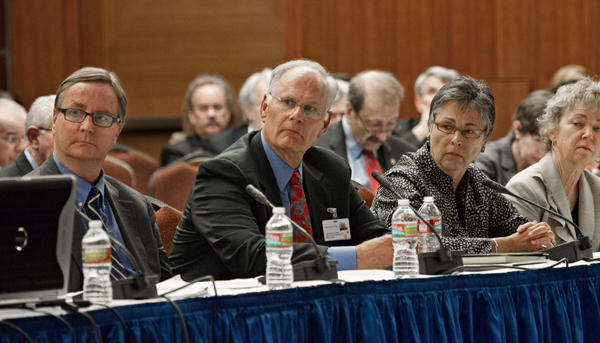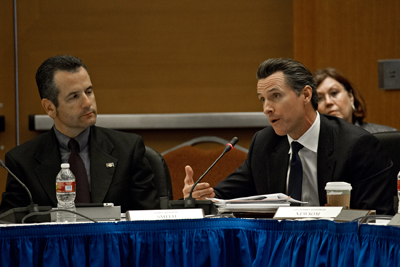Chancellor to Appoint Board of Directors to Ensure UCSF's Ability to Deliver on its Public Mission
UCSF Chancellor Susan Desmond-Hellmann speaks to the UC Regents about her plan to form an advisory board during the meeting at UCSF Mission Bay on July 18.
UCSF will form a dedicated advisory board to help ensure that the University continues to excel as a health sciences innovator and deliver on its critically important public mission, Chancellor Susan Desmond-Hellmann, MD, MPH, told the UC Regents on July 18.
The new UCSF board will serve as strategic advisors to the chancellor and, through the chancellor, to UC President Mark Yudof and the Board of Regents, Desmond-Hellmann told the Regents with members of her leadership team at her side at UCSF Mission Bay.
Chancellor's Plan for the Future of UCSF
- UCSF: Planning for the Future, Chancellor's Presentation to the Regents [PDF]
- UCSF’s Public Mission
- UCSF’s Three-Year Plan
“Among the 10 campuses, UCSF is uniquely challenged as the only campus solely focused on the health sciences,” she told the Regents. “The crisis in health care, diminishing state support, rising student debt, escalating employee benefit costs and downward pressure on research funding have created a ‘perfect storm’ in the competitive health sciences marketplace which requires urgent action.”
In January, UC President Yudof and UC Regent Chair Lansing approved the chancellor’s request to form a working group to examine ways in which a board could help direct the future of UCSF. She said the working group’s research and analysis demonstrated that there is value in creating a UCSF board that is specifically charged with the role of serving as UCSF’s strategic partner.
"The working group proposed the appointment of a group of dedicated directors with operational and strategic expertise to guide UCSF through these challenging times," Desmond-Hellmann told the Regents.
The chancellor said she will return to the Regents in about six months to share the UCSF board’s charter, membership and metrics for success.
“I see this as a pilot, something that will continue to evolve as we find the best way to work with this UCSF board,” Desmond-Hellmann said. “One of the learnings that I've had through this process is that there’s interest from the chancellors, others in the system and I would like to share this as a pilot.”
UC President Mark Yudof congratulated the chancellor and the working group for doing a "superb job" throughout the process of determining a governance structure that will help UCSF succeed. "This is really important," he said. "This is such a wonderful institution and we need to build up the expertise available to the chancellor."

Members of the UCSF leadership team, from left, Sam Hawgood, dean of the UCSF School of Medicine; Mark Laret, CEO of UCSF Medical Center and UCSF Benioff Children's Hospital; Barbara J. French, vice chancellor of Strategic Communications and University Relations; and Marcia Canning, campus attorney, listen to Chancellor Susan Desmond-Hellmann's presentation to the UC Regents on Wednesday at UCSF Mission Bay.
UC Regent Chair Lansing also commended the chancellor and said the creation of a UCSF board of experts is a "potentially very exciting situation" for UCSF and the entire UC system.
What's at Stake
Before her presentation to the Regents' education committee, Desmond-Hellmann explained what's at stake for UCSF, a $4 billion health sciences enterprise.
“This is an extremely challenging time for the University of California and for public institutions of higher learning all across the country,” she said. “What is at stake is our ability to serve our public mission of providing access to world-class teaching and patient care and to carry out pioneering scientific research. At this time, it’s critical we have input from dedicated expertise that strengthens our focus and decision making. The decisions we make today must result in a strong financial future that allows us to continue to be one of the best health sciences universities in the world.”
The University of California is vital to the future of the state and the nation, Desmond-Hellmann said, and UCSF must optimize its performance and serve UC’s important public mission. She emphasized that UCSF remains strongly committed to the UC system and its nine sister campuses.
The chancellor said the UCSF board would partner with her and her leadership team to:
- Identify and frame the most critical challenges facing UCSF over the next few years;
- Jointly evolve the UCSF business plan to address those challenges;
- Evaluate new and enhanced opportunities to grow revenues; and
- Ensure UCSF’s excellence to effectively compete in the changing health care marketplace.
The strength of such a board, she said, is in appointing members who have deep expertise in areas that are changing rapidly and are vital to UCSF’s successful future. These areas include health sciences research, graduate education, policy, technology, health care customer service, and real estate, among others.
Desmond-Hellmann cited several examples of the contributions that UCSF would derive from a dedicated board. For example, such a board would play a key role in keeping UCSF focused on its three-year plan, holding leadership accountable for progress.
Factors for UCSF Board’s Success
The success of the new UCSF board depends upon several key factors, she said, including:
- Identifying the right board members;
- Appointing a board that is strongly engaged, with a clear purpose;
- Creating a structure that promotes rigorous and efficient decision-making, without added bureaucracy;
- Including a formal evaluation process for the board and pathway for continued evolution; and
- Getting a commitment by the Regents and UC President Yudof to its success.

Lt. Gov. Gavin Newsom commends UCSF Chancellor Susan Desmond-Hellmann for her stewardship of the working group's process at the UC Regents meeting.
Desmond-Hellmann said the working group forwarded her two options for a new governance model. Each option worked within the current structure of the UC Regents and the UC Office of the President (UCOP), and did not alter the Regent’s fiduciary responsibilities. The first option was to create a UCSF board that is advisory to both the chancellor and the Regents. The second was to create a board with a limited scope of authorities delegated by the Regents.
The chancellor took these options under consideration, explained her thinking to the Regents, and decided an appropriate first step would be to appoint a volunteer UCSF board.
UCSF currently has two primary volunteer boards that provide counsel to campus leadership. The UCSF Foundation Board, established in 1982, is the philanthropic arm of the University. The Chancellor’s Advisory Board, convened in 2010, provides guidance and intellectual resources to the UCSF leadership team and chancellor. The new board will be charged specifically with serving as UCSF’s strategic partner and being dedicated to maximizing UCSF’s strategic decision-making and position for the future. The UC Board of Regents is the sole governing body for the 10-campus UC system.
“We realize that all the Regents work extremely hard dealing with the challenges of running a large and complex system,” said Desmond-Hellmann. "The reality is that you just don't have time or opportunity to dig into the detailed and complex profiles of 10 very different campuses and help each individual campus wrestle with their own set of top challenges."
“Given the challenges facing us and the need to remain competitive with our peers, there is a compelling case for modifying the current structure of governance to maximize strategic decision making and to position UCSF for the future,” she said.
Working to Secure UCSF’s Financial Future
The formation of the UCSF board is the next step in UCSF’s ongoing efforts to secure its financial future and achieve its vision to “be the world’s preeminent health sciences innovator.”
For more than two years, the UCSF community has been working internally through its Operational Excellence initiative to realize cost savings and efficiencies through administrative restructuring that has so far achieved annual savings of $43.9 million.
The chancellor appointed the members to the “Future of UCSF” working group in February, with the concurrence of Yudof and Lansing. The 13-member group was co-chaired by Sam Hawgood, MBBS, dean of the UCSF School of Medicine and vice chancellor for medical affairs, and Nathan Bostrom, executive vice president of business operations at UCOP.
The working group met as a full team five times, while its teams on finance and governance met weekly for a total of 12 times.
The working group’s governance team – co-chaired by Mark Laret, chief executive officer of the UCSF Medical Center and UCSF Benioff Children’s Hospital, and Jack Stobo, senior vice president of health sciences and services at UCOP – analyzed the governance models of 11 benchmark institutions, including Ohio State University, Oregon Health & Science University, University of New Mexico, University of Washington and Johns Hopkins Medicine, as well as the Los Alamos National Laboratory and UC Hastings. It also engaged Harvard professor Richard Chait, PhD, expert on non-profit governance, to discuss the pros and cons of various models and worked closely with the UCSF team.
“I have learned a great deal from the working group and the extensive research into alternate governance models,” Desmond-Hellmann said, adding that the board would provide oversight, foresight and insight.
UCSF Chancellor Susan Desmond-Hellmann talks about her plan to appoint an advisory board during a short interview before her presentation to the Regents on July 18.
The finance team, co-chaired by UCOP’s Brostrom and John Plotts, UCSF senior vice chancellor for finance and administration, provided recommendations related to UCSF’s financial relationship with the UC system and identified innovative financing options, which represent the entrepreneurial thinking that UCSF aims to enhance with the new board. The team’s financial recommendations are being considered and she did not discuss the details at the Regents meeting.
“I am personally committed to maintaining and growing the excellence of UCSF in support of our public mission and I firmly believe that the steps outlined [today] will be in service to both those objective,” she told the Regents. “My hope and desire is that as we continue this process, the UCSF Board will be seen by the President and Regents as an asset – not just to myself and my leadership team, but to you and the people of California.”
Photos by Susan Merrell
Related Links:
Chancellor Proposes New Approach to Secure UCSF’s Financial Future